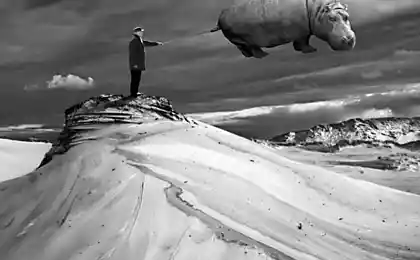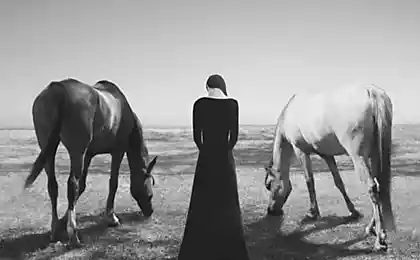1169
The case law and in life, "Ramsay"
October 4, 2010 marks 115 years since the birth of the famous Soviet spy Richard Sorge. In our time, it is written on the sea book, and to countless films, but half a century ago about Sorge did not know anybody, except the top management of the country.
6 photo + letter
via Boris Sokolov.
1. German passport of the Third Reich. Sorge was able to get a miracle
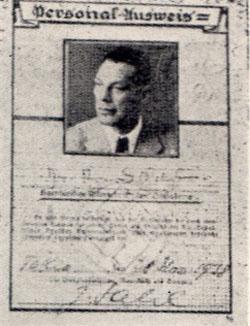
Richard Sorge worked for German intelligence, but only for the benefit of the Soviet Union.
Legendary Soviet spy Richard Sorge was unknown in the Soviet Union before the beginning of the 60s until the screen has not left the French film "Who are you, Dr. Sorge?" Yves Ciampi (Yves Ciampi, 1921-1982). Then Khrushchev (1894-1971) looked at the tape in the country, became interested in the posthumous fate of the forgotten hero. And when the authorities reported to him that such a man really worked for Soviet intelligence, he gathered his Welcome Golden Star, but did not, because the October 14, 1964 was overthrown. Nevertheless, recognition for Sorge was one of the few initiatives Nikita that the new government does not reacted to his "voluntarism" - and it was brought to an end. November 5, 1964 issued a decree on conferring the title of Hero Richard Sorge, the Soviet Union.
2. A still from the movie Yves Ciampi "Who are you, Dr. Sorge?". This frame shows the moment when Richard Sorge with their radio operators, Max and Anna Clausen, viewing the film with photographs of secret documents
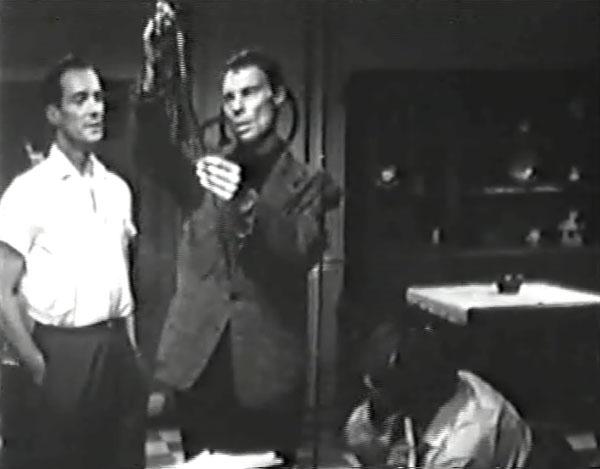
In that suit a nurse.
Richard Sorge did not live 50 years, but has a rich biography, which befits the real agents of espionage novels. Future Scout born October 4, 1895 in a suburb of Baku, Sabunchu settlement, the family engineer Gustav Wilhelm Sorge (Gustav Wilhelm Richard Sorge, 1852-1907) - a German who worked in the oil company of Nobel brothers. Richard's mother - Nina Stepanovna Kobelev - was Russian. When the little Richard was three years old, the family returned to Germany.
In 1914, after the outbreak of the First World War, Sorge Jr. went to the front as a volunteer. He served in the artillery, was wounded three times, the most difficult thing - in March 1916 at Verdun. Shards killed his feet, and he is not able to move for three days hanging on the barbed wire in the neutral zone. One leg would be amputated, but experienced surgeon saved the day. However, after surgery Sorge lifelong limp, his left leg was shorter than a couple of centimeters. After the hospital brave gunner fired at the non-commissioned officers were awarded the Iron Cross 2nd Class and the reserve.
While still in the hospital Konigsberg, Richard realized that he no longer believes in the ideals of Pan, which led to the senseless slaughter on the margins of Europe. And fate would have it, to nurse, care for the wounded, he was a socialist. Thanks to her, he not only became a man, but also gained new friends, enthusiastic ideas of Marxism. True, perhaps, to say here and heredity: Richard accounted cousin nephew Friedrich Sorge (Friedrich Adolf Sorge, 1828-1906) - Secretary of Karl Marx and one of the leaders I International. But rather, it is a topic for fans of esoterica.
In 1918, Sorge took part in the November revolution defeated, and a year later joined the ranks of the German Communists. Party work does not interfere with his scientific pursuits. In 1919 - he had already received his doctorate in public law, with a thesis at the University of Hamburg. Between times, Richard led his supervisor's wife - Christina Gerlach (Christiane Gerlach), that does not prevent further friendship between teacher and student. Moreover, Sorge was active at the Frankfurt Institute for Social Research (Institut für Sozialforschung), famous for its neo-Marxist school. However, after the defeat of the communist uprising in October 1923 a young scientist was forced to go underground, where its function was to ensure the safety of the employees of the Communist International, who came to Germany. But the political situation in the Weimar Republic became harder, so Sorge immediately agreed with the proposal of the Soviet comrades in the Comintern to move to Moscow.
3. Richard Sorge Street in the east (the former "socialist") Berlin - perhaps everything that reminds Germans of their famous compatriot. Photos (Creative Commons license): Achim Raschka
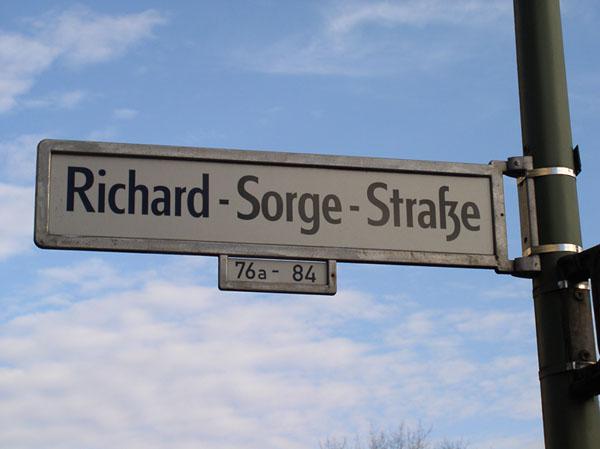
Exploration as a lifestyle.
In 1924, Richard received Soviet citizenship, and in 1925 joined the CPSU (b). Now, he worked in the Department of International Relations of the Communist International, whose task was to determine the degree of readiness of the proletariat to the foreign world revolution, in other words - exploration. The Comintern Sorge friends with Nikolai Bukharin (1888-1938) and was considered him a man. So, when at the end of 1928 that removed from all leadership positions, Sorge was also virtually suspended from work. But Richard was lucky: his analytical skills, language skills and extensive contacts have attracted the interest of military intelligence, and in 1929 he was taken to the Intelligence unit of the Red Army. Then he married Catherine Maximova - girl, who taught him Russian (relationship Sorge with Christina Gerlach were long gone).
The first major task of Sorge was a trip to Shanghai in 1930. The Soviet leadership is strongly interested in the course of the civil war in China: military and economic potential of the government Chiang Kai-shek (蔣介石, 1887-1975) and the strength of the Chinese Communists. In the Far East Sorge he worked under the name of Dr. Jones, scholar and journalist from Germany, ostensibly studying agriculture. And I must say that his remarks in the German media have enjoyed great popularity. While traveling around the country, he met the famous American journalist, leftist, - Agnes Smedley (Agnes Smedley, 1892-1950). I suspect that they had even a novel. And it is not surprising: charming, witty, courageous - Sorge always loved women, and most of them loves it. Whether recruited Richard Agnes or not, can not say exactly, but, undoubtedly, it was his tsenneyshem informant. The fact that Smedley was in friendship with the widow of Sun Yat-sen (孫逸仙, 1866-1925), which, in turn, knew his wife Chiang Kai-shek. So Sorge was aware of some of the secrets of the Chinese Kuomintang. But Agnes had Zorge and another invaluable service, introducing him to a Japanese journalist Hotsumi Ozaki (尾崎 秀 実, 1901-1944). It will be the main Marxist Ozaki informant Sorge during the Tokyo mission, which has become both a "high point" of Richard, and the tragic end of his espionage career.
German passport of the Third Reich. Sorge was able to get a miracle
In 1933, Sorge was nearly failed, trying to free from the hands of the police uncovered two workers of the Comintern, and the Kremlin it withdrew from China. Now, Richard had to go to Tokyo in 1931, the Japanese seizure of Manchuria and threatened the Soviet Primorye, so that your resident in Japan Red Army military intelligence was vital. At home among strangers.
From Moscow, Sorge went straight to Germany. In Berlin, he has engaged in a writing communication world (and its publication, as we have said, there have been widely known), and has been accredited in the influential newspaper "Frankfurter Zeitung» («Frankfurter Zeitung»), which was ready to send him to Japan as their own correspondent. Moreover, Sorge was able to legally obtain a new German passport (he's remained a German citizen) and go to the East under his real name! And this despite the fact that in the archives of the German police kept the case to Sorge-communist. So meticulous Germans have missed a Soviet agent.
Using his extensive knowledge of the affairs of the Asia-Pacific region, analytical skills and the ability to associate with people who soon became his Sorge among German diplomats in Tokyo. Especially he became friendly with the military attaché Colonel Eugen Ott (Eugen Ott, 1889-1977). Undoubtedly, this contributed to the letter, this Sorge Dr. Zeller - journalist and wartime friends Ott. The letter recommended Richard Zeller as a person worthy of full trust. There is also a version according to which a certain role here was played by the spouse Ott - Helm (Helma Ott), alleged Russian spy who became his mistress. The intrigue consisted in the fact that Richard and Helm had known each other since 1920 and Mrs. Ott knew that Sorge was in the Communist Party. But she remained dumb: whether because of the fact that Richard really loved, whether at Sorge was on her dirt. But be that as it may, Sorge became, in fact, an adviser Ott and even wrote him analytical reports to Berlin, and he has opened access to most of the mysteries of the embassy.
In 1938, Ott got the rank of general and became ambassador, and Sorge turned in his covert political adviser. However, now he at least had access to the documents of the military attache, because of what has become more difficult to judge the military plans of Germany. Sorge also joined the NSDAP, good biography was the best - a war invalid and Knight of the Iron Cross. At the embassy, he was known as a staunch Nazi and an ardent admirer of the Führer. Simultaneously, Sorge became an informant for the Abwehr, the German intelligence supplying quite benign information about Japan. But all this was done only in order to gain the confidence of Nazis and get as much information about the Japanese and German military and political plans to transfer to the Soviet Union. Stranger among his.
I must say that in Tokyo, Sorge lived in grand style. He had a constant lover - Hanako Ishii (石井 花子, 1911-2000), worked as a waitress in a restaurant for foreigners "Rheingold." They met October 4, 1935, when Sorge celebrated his birthday. The six-year affair with Ishii, however, did not rule out new adventures of Don Juan Soviet agent. According to Japanese intelligence for the years spent in this country Sorge, he had 30 mistresses. In addition, Richard abused alcohol, often get into fights or frantically ran around Tokyo night on a motorcycle.
Hanako Ishii could not even think that her lover is actually a Soviet agent
However, this does not mean that Sorge was a playboy, do not deliver anything of value to the Centre. This is not so. Sorge possessed the most valuable sources of confidential information: one of them was Ott, the second - the aforementioned Hotsumi Ozaki, who by that time became an adviser to the Japanese prime minister - Prince Konoe Fumimaro (近衞 文 麿, 1891-1945). All information provided by them, "Ramsay" (Sorge emissary alias) regularly passed to Moscow.
But times have changed. During the second half of the repression of the 1930s killed many comrades Sorge of the Comintern. In 1937-1938, he was shot almost all the leaders of the Intelligence of the Red Army. Many residents working abroad, returned to the USSR and was subjected to reprisals. Sorge himself in the years 1938-1940 has repeatedly refused to come to the "land of the Soviets" ostensibly for instruction. He suspected (not without reason) that the return to Tokyo he will not give. In response, the NKVD arrested his wife. Ekaterina Maximova was exiled to the Krasnoyarsk Territory, where she was to die in 1943. But her fate remained unknown Sorge, as well as the fate of the former chief of the Intelligence Ian Berzin (1889-1938), could not resist questioning, and gave evidence against Sorge as a German agent. Although from the information sent by Sorge in Moscow completely refused, her credibility was low.
A Sorge reported unimportant things. In particular, on the preparation of the German attack on the Soviet Union. However, the data presented to them, in most cases have only been indirect (date of 22 June, he never called). Thus, May 30, 1941 Sorge reported:
Ott informed Berlin that the German action against the USSR will begin in the second half of June. Ott 95% sure that the war will begin. Circumstantial evidence for going to war are: the technical department of the German Air Force in Tokyo was instructed to return to Germany. Ott asked the military attache that he did not send any important messages through the Soviet Union. Real rubber through the USSR reduced to a minimum.
By the voice of "Ramsay" in the Kremlin began to listen only after the outbreak of hostilities. He justified this trust. Thanks Hotsumi Ozaki Sorge collected and analyzed information showing by that Japan is not going to attack the USSR. Japan was more important to seek victory in the zone of the South Seas, as only there is Japan could obtain oil, vital for the continuation of the expansion to the west and north. September 14, 1941 Sorge reported:
According to the source Invest (emissary alias Ozaki), the Japanese government decided this year not to oppose the Soviet Union, but the armed forces will be left in Manchukuo in case of speech in the spring of next year, in case of defeat the Soviet Union at that time.
It was one of the last reports "Ramsay", which to a large extent helped Stalin decide to transfer divisions from Siberia and the Far East to help Moscow.
4. Hanako Ishii could not even think that her lover is actually a Soviet agent
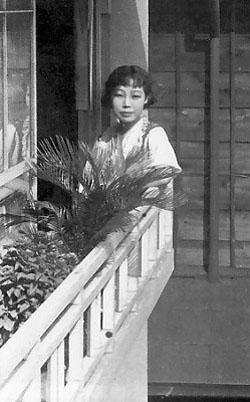
Needless to scout Marshal?
"Ramzan" and his group had committed no "pinholes" and yet in October 1941, they were arrested by the Japanese police. The authorities helped the accident. Through a third party, they went to the artist Ёtoku Miyagi (宮城 興 徳, 1903-1943), who worked with Sorge (one of Japanese Communists, and were unaware of the existence of the group Zorge, in the interrogation remembered that Miyagi was living in the United States and was in the Communist Party). When arrested Miyagi himself (as a Communist, and not as a scout), he first tried to make a hara-kiri, and when he failed, out of the window, but again survived. Torture of him was so unbearable that he passed the whole group.
Sorge took the last one. The protests have not helped the German ambassador. In Germany, the investigation was conducted, which revealed the communist past Richard. A year after the arrest of Sorge Eugen Ott was called back to Germany, but like Sorge at the time, thought it best not to return home until the end of the war settled in China.
After the arrest of Richard for a long time I did not lock up, since all members of the group were arrested and gave evidence. In prison, where he had to spend three years, he wrote his memoirs, which later fell into the hands of the Americans and were published under the title "Prison Notes". There he confirmed his allegiance to communist beliefs. September 29, 1944 Sorge and Ozaki were sentenced to death by hanging, the other members of the group received various prison sentences of up to life. The death sentence was executed November 7, 1944 in Sugamo Prison. Unfortunately, the basic materials of the investigation and trial of Sorge burned during the American bombing of Tokyo.
The first report of the arrest of the group Sorge Japanese newspapers published only 17 May 1942. They claimed that the arrested spies on the instructions of the Comintern. The Soviet Union was not mentioned, in order to avoid deterioration of relations. Contrary to legend, has been preserved in the archives of any traces of the Japanese attempts to achieve the exchange of Field Marshal Paulus Sorge (Friedrich Wilhelm Ernst Paulus, 1890-1957). This issue will likely not even arise. Paulus exchanged at that time simply did not make any sense: it could be regarded as an unfriendly act towards the USSR. After all that time, when Paulus was captured, it was clear that Germany Japan already can not help you. The Japanese, suffering defeats in the Pacific, were not interested in worsening relations with Moscow. So Richard was doomed.
5. Still from the film Masahiro Shinoda (篠 田 正浩,) «Spy Sorge" (2003). Here is an episode of the arrest "Ramsay." He took the last, because all night at his home was a car with numbers of the German Embassy. Police also still did not want to bring the matter public. Who came in that car? It is not known, but most likely, Helma Ott
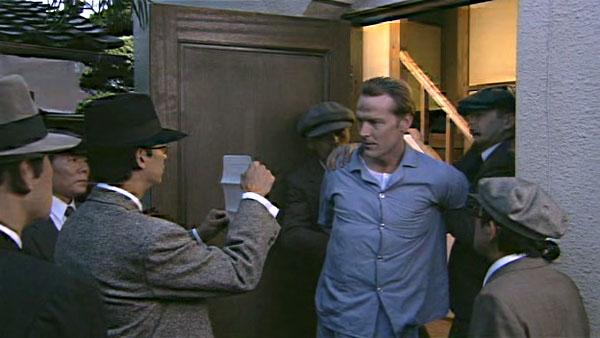
Under Stalin, Sorge did not even entered the pantheon of Soviet spies. On it was three reasons. Firstly, Sorge repeatedly refused to return to the USSR, which was considered almost a betrayal. Second, he worked in the German intelligence (as was then known), without informing the notified Moscow. Third, after the arrest quickly admitted that working on the Soviet Union. All this does not fit into the heroic Soviet canon.
Only twenty years after his death, in more liberal times, "thaw" second homeland, for which he died, paid tribute to Richard Sorge. A Hanako Ishii, just after the war, she learned that her lover was a great spy, found his prison grave and reburied favorite on the Tokyo Tama Cemetery in Tokyo.
6. The grave of Richard Sorge very unassuming: only inscription with the name in three languages and a small Star of the Hero. Hanako Ishii until death came to her to cry on favorite.
Source:
6 photo + letter
via Boris Sokolov.
1. German passport of the Third Reich. Sorge was able to get a miracle

Richard Sorge worked for German intelligence, but only for the benefit of the Soviet Union.
Legendary Soviet spy Richard Sorge was unknown in the Soviet Union before the beginning of the 60s until the screen has not left the French film "Who are you, Dr. Sorge?" Yves Ciampi (Yves Ciampi, 1921-1982). Then Khrushchev (1894-1971) looked at the tape in the country, became interested in the posthumous fate of the forgotten hero. And when the authorities reported to him that such a man really worked for Soviet intelligence, he gathered his Welcome Golden Star, but did not, because the October 14, 1964 was overthrown. Nevertheless, recognition for Sorge was one of the few initiatives Nikita that the new government does not reacted to his "voluntarism" - and it was brought to an end. November 5, 1964 issued a decree on conferring the title of Hero Richard Sorge, the Soviet Union.
2. A still from the movie Yves Ciampi "Who are you, Dr. Sorge?". This frame shows the moment when Richard Sorge with their radio operators, Max and Anna Clausen, viewing the film with photographs of secret documents

In that suit a nurse.
Richard Sorge did not live 50 years, but has a rich biography, which befits the real agents of espionage novels. Future Scout born October 4, 1895 in a suburb of Baku, Sabunchu settlement, the family engineer Gustav Wilhelm Sorge (Gustav Wilhelm Richard Sorge, 1852-1907) - a German who worked in the oil company of Nobel brothers. Richard's mother - Nina Stepanovna Kobelev - was Russian. When the little Richard was three years old, the family returned to Germany.
In 1914, after the outbreak of the First World War, Sorge Jr. went to the front as a volunteer. He served in the artillery, was wounded three times, the most difficult thing - in March 1916 at Verdun. Shards killed his feet, and he is not able to move for three days hanging on the barbed wire in the neutral zone. One leg would be amputated, but experienced surgeon saved the day. However, after surgery Sorge lifelong limp, his left leg was shorter than a couple of centimeters. After the hospital brave gunner fired at the non-commissioned officers were awarded the Iron Cross 2nd Class and the reserve.
While still in the hospital Konigsberg, Richard realized that he no longer believes in the ideals of Pan, which led to the senseless slaughter on the margins of Europe. And fate would have it, to nurse, care for the wounded, he was a socialist. Thanks to her, he not only became a man, but also gained new friends, enthusiastic ideas of Marxism. True, perhaps, to say here and heredity: Richard accounted cousin nephew Friedrich Sorge (Friedrich Adolf Sorge, 1828-1906) - Secretary of Karl Marx and one of the leaders I International. But rather, it is a topic for fans of esoterica.
In 1918, Sorge took part in the November revolution defeated, and a year later joined the ranks of the German Communists. Party work does not interfere with his scientific pursuits. In 1919 - he had already received his doctorate in public law, with a thesis at the University of Hamburg. Between times, Richard led his supervisor's wife - Christina Gerlach (Christiane Gerlach), that does not prevent further friendship between teacher and student. Moreover, Sorge was active at the Frankfurt Institute for Social Research (Institut für Sozialforschung), famous for its neo-Marxist school. However, after the defeat of the communist uprising in October 1923 a young scientist was forced to go underground, where its function was to ensure the safety of the employees of the Communist International, who came to Germany. But the political situation in the Weimar Republic became harder, so Sorge immediately agreed with the proposal of the Soviet comrades in the Comintern to move to Moscow.
3. Richard Sorge Street in the east (the former "socialist") Berlin - perhaps everything that reminds Germans of their famous compatriot. Photos (Creative Commons license): Achim Raschka

Exploration as a lifestyle.
In 1924, Richard received Soviet citizenship, and in 1925 joined the CPSU (b). Now, he worked in the Department of International Relations of the Communist International, whose task was to determine the degree of readiness of the proletariat to the foreign world revolution, in other words - exploration. The Comintern Sorge friends with Nikolai Bukharin (1888-1938) and was considered him a man. So, when at the end of 1928 that removed from all leadership positions, Sorge was also virtually suspended from work. But Richard was lucky: his analytical skills, language skills and extensive contacts have attracted the interest of military intelligence, and in 1929 he was taken to the Intelligence unit of the Red Army. Then he married Catherine Maximova - girl, who taught him Russian (relationship Sorge with Christina Gerlach were long gone).
The first major task of Sorge was a trip to Shanghai in 1930. The Soviet leadership is strongly interested in the course of the civil war in China: military and economic potential of the government Chiang Kai-shek (蔣介石, 1887-1975) and the strength of the Chinese Communists. In the Far East Sorge he worked under the name of Dr. Jones, scholar and journalist from Germany, ostensibly studying agriculture. And I must say that his remarks in the German media have enjoyed great popularity. While traveling around the country, he met the famous American journalist, leftist, - Agnes Smedley (Agnes Smedley, 1892-1950). I suspect that they had even a novel. And it is not surprising: charming, witty, courageous - Sorge always loved women, and most of them loves it. Whether recruited Richard Agnes or not, can not say exactly, but, undoubtedly, it was his tsenneyshem informant. The fact that Smedley was in friendship with the widow of Sun Yat-sen (孫逸仙, 1866-1925), which, in turn, knew his wife Chiang Kai-shek. So Sorge was aware of some of the secrets of the Chinese Kuomintang. But Agnes had Zorge and another invaluable service, introducing him to a Japanese journalist Hotsumi Ozaki (尾崎 秀 実, 1901-1944). It will be the main Marxist Ozaki informant Sorge during the Tokyo mission, which has become both a "high point" of Richard, and the tragic end of his espionage career.
German passport of the Third Reich. Sorge was able to get a miracle
In 1933, Sorge was nearly failed, trying to free from the hands of the police uncovered two workers of the Comintern, and the Kremlin it withdrew from China. Now, Richard had to go to Tokyo in 1931, the Japanese seizure of Manchuria and threatened the Soviet Primorye, so that your resident in Japan Red Army military intelligence was vital. At home among strangers.
From Moscow, Sorge went straight to Germany. In Berlin, he has engaged in a writing communication world (and its publication, as we have said, there have been widely known), and has been accredited in the influential newspaper "Frankfurter Zeitung» («Frankfurter Zeitung»), which was ready to send him to Japan as their own correspondent. Moreover, Sorge was able to legally obtain a new German passport (he's remained a German citizen) and go to the East under his real name! And this despite the fact that in the archives of the German police kept the case to Sorge-communist. So meticulous Germans have missed a Soviet agent.
Using his extensive knowledge of the affairs of the Asia-Pacific region, analytical skills and the ability to associate with people who soon became his Sorge among German diplomats in Tokyo. Especially he became friendly with the military attaché Colonel Eugen Ott (Eugen Ott, 1889-1977). Undoubtedly, this contributed to the letter, this Sorge Dr. Zeller - journalist and wartime friends Ott. The letter recommended Richard Zeller as a person worthy of full trust. There is also a version according to which a certain role here was played by the spouse Ott - Helm (Helma Ott), alleged Russian spy who became his mistress. The intrigue consisted in the fact that Richard and Helm had known each other since 1920 and Mrs. Ott knew that Sorge was in the Communist Party. But she remained dumb: whether because of the fact that Richard really loved, whether at Sorge was on her dirt. But be that as it may, Sorge became, in fact, an adviser Ott and even wrote him analytical reports to Berlin, and he has opened access to most of the mysteries of the embassy.
In 1938, Ott got the rank of general and became ambassador, and Sorge turned in his covert political adviser. However, now he at least had access to the documents of the military attache, because of what has become more difficult to judge the military plans of Germany. Sorge also joined the NSDAP, good biography was the best - a war invalid and Knight of the Iron Cross. At the embassy, he was known as a staunch Nazi and an ardent admirer of the Führer. Simultaneously, Sorge became an informant for the Abwehr, the German intelligence supplying quite benign information about Japan. But all this was done only in order to gain the confidence of Nazis and get as much information about the Japanese and German military and political plans to transfer to the Soviet Union. Stranger among his.
I must say that in Tokyo, Sorge lived in grand style. He had a constant lover - Hanako Ishii (石井 花子, 1911-2000), worked as a waitress in a restaurant for foreigners "Rheingold." They met October 4, 1935, when Sorge celebrated his birthday. The six-year affair with Ishii, however, did not rule out new adventures of Don Juan Soviet agent. According to Japanese intelligence for the years spent in this country Sorge, he had 30 mistresses. In addition, Richard abused alcohol, often get into fights or frantically ran around Tokyo night on a motorcycle.
Hanako Ishii could not even think that her lover is actually a Soviet agent
However, this does not mean that Sorge was a playboy, do not deliver anything of value to the Centre. This is not so. Sorge possessed the most valuable sources of confidential information: one of them was Ott, the second - the aforementioned Hotsumi Ozaki, who by that time became an adviser to the Japanese prime minister - Prince Konoe Fumimaro (近衞 文 麿, 1891-1945). All information provided by them, "Ramsay" (Sorge emissary alias) regularly passed to Moscow.
But times have changed. During the second half of the repression of the 1930s killed many comrades Sorge of the Comintern. In 1937-1938, he was shot almost all the leaders of the Intelligence of the Red Army. Many residents working abroad, returned to the USSR and was subjected to reprisals. Sorge himself in the years 1938-1940 has repeatedly refused to come to the "land of the Soviets" ostensibly for instruction. He suspected (not without reason) that the return to Tokyo he will not give. In response, the NKVD arrested his wife. Ekaterina Maximova was exiled to the Krasnoyarsk Territory, where she was to die in 1943. But her fate remained unknown Sorge, as well as the fate of the former chief of the Intelligence Ian Berzin (1889-1938), could not resist questioning, and gave evidence against Sorge as a German agent. Although from the information sent by Sorge in Moscow completely refused, her credibility was low.
A Sorge reported unimportant things. In particular, on the preparation of the German attack on the Soviet Union. However, the data presented to them, in most cases have only been indirect (date of 22 June, he never called). Thus, May 30, 1941 Sorge reported:
Ott informed Berlin that the German action against the USSR will begin in the second half of June. Ott 95% sure that the war will begin. Circumstantial evidence for going to war are: the technical department of the German Air Force in Tokyo was instructed to return to Germany. Ott asked the military attache that he did not send any important messages through the Soviet Union. Real rubber through the USSR reduced to a minimum.
By the voice of "Ramsay" in the Kremlin began to listen only after the outbreak of hostilities. He justified this trust. Thanks Hotsumi Ozaki Sorge collected and analyzed information showing by that Japan is not going to attack the USSR. Japan was more important to seek victory in the zone of the South Seas, as only there is Japan could obtain oil, vital for the continuation of the expansion to the west and north. September 14, 1941 Sorge reported:
According to the source Invest (emissary alias Ozaki), the Japanese government decided this year not to oppose the Soviet Union, but the armed forces will be left in Manchukuo in case of speech in the spring of next year, in case of defeat the Soviet Union at that time.
It was one of the last reports "Ramsay", which to a large extent helped Stalin decide to transfer divisions from Siberia and the Far East to help Moscow.
4. Hanako Ishii could not even think that her lover is actually a Soviet agent

Needless to scout Marshal?
"Ramzan" and his group had committed no "pinholes" and yet in October 1941, they were arrested by the Japanese police. The authorities helped the accident. Through a third party, they went to the artist Ёtoku Miyagi (宮城 興 徳, 1903-1943), who worked with Sorge (one of Japanese Communists, and were unaware of the existence of the group Zorge, in the interrogation remembered that Miyagi was living in the United States and was in the Communist Party). When arrested Miyagi himself (as a Communist, and not as a scout), he first tried to make a hara-kiri, and when he failed, out of the window, but again survived. Torture of him was so unbearable that he passed the whole group.
Sorge took the last one. The protests have not helped the German ambassador. In Germany, the investigation was conducted, which revealed the communist past Richard. A year after the arrest of Sorge Eugen Ott was called back to Germany, but like Sorge at the time, thought it best not to return home until the end of the war settled in China.
After the arrest of Richard for a long time I did not lock up, since all members of the group were arrested and gave evidence. In prison, where he had to spend three years, he wrote his memoirs, which later fell into the hands of the Americans and were published under the title "Prison Notes". There he confirmed his allegiance to communist beliefs. September 29, 1944 Sorge and Ozaki were sentenced to death by hanging, the other members of the group received various prison sentences of up to life. The death sentence was executed November 7, 1944 in Sugamo Prison. Unfortunately, the basic materials of the investigation and trial of Sorge burned during the American bombing of Tokyo.
The first report of the arrest of the group Sorge Japanese newspapers published only 17 May 1942. They claimed that the arrested spies on the instructions of the Comintern. The Soviet Union was not mentioned, in order to avoid deterioration of relations. Contrary to legend, has been preserved in the archives of any traces of the Japanese attempts to achieve the exchange of Field Marshal Paulus Sorge (Friedrich Wilhelm Ernst Paulus, 1890-1957). This issue will likely not even arise. Paulus exchanged at that time simply did not make any sense: it could be regarded as an unfriendly act towards the USSR. After all that time, when Paulus was captured, it was clear that Germany Japan already can not help you. The Japanese, suffering defeats in the Pacific, were not interested in worsening relations with Moscow. So Richard was doomed.
5. Still from the film Masahiro Shinoda (篠 田 正浩,) «Spy Sorge" (2003). Here is an episode of the arrest "Ramsay." He took the last, because all night at his home was a car with numbers of the German Embassy. Police also still did not want to bring the matter public. Who came in that car? It is not known, but most likely, Helma Ott

Under Stalin, Sorge did not even entered the pantheon of Soviet spies. On it was three reasons. Firstly, Sorge repeatedly refused to return to the USSR, which was considered almost a betrayal. Second, he worked in the German intelligence (as was then known), without informing the notified Moscow. Third, after the arrest quickly admitted that working on the Soviet Union. All this does not fit into the heroic Soviet canon.
Only twenty years after his death, in more liberal times, "thaw" second homeland, for which he died, paid tribute to Richard Sorge. A Hanako Ishii, just after the war, she learned that her lover was a great spy, found his prison grave and reburied favorite on the Tokyo Tama Cemetery in Tokyo.
6. The grave of Richard Sorge very unassuming: only inscription with the name in three languages and a small Star of the Hero. Hanako Ishii until death came to her to cry on favorite.
Source:

















